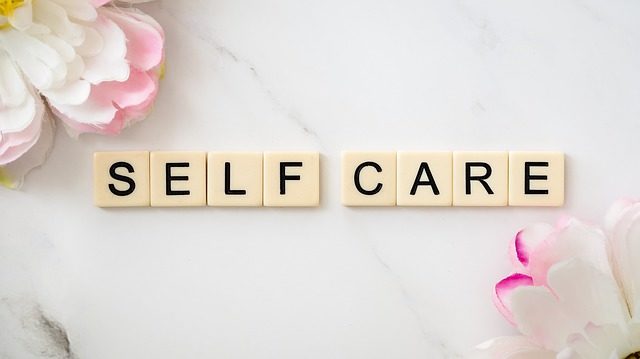6 Types Of Self-Care To Keep You Healthy And Productive
There are some affiliate links below, but they are all products I highly recommend. For more info, view my disclosure here.
Self-care is a critical part of handling your mental health. Using self-care as a coping mechanism can help you recognize patterns in your mental health. There are many types of self-care and they are all important.
One thing that’s majorly important about self-care is to work on it daily. If you take care of yourself once a week, it won’t be as effective. It shouldn’t feel like a chore, it should feel calm, like a reward.
Keep in mind, self-care doesn’t have to be anything extreme. While a spa day is my personal ultimate form of self-care, that takes money, honey! With all the demands of new homeownership (we just settled into our home in the mountains of Colorado!) I certainly can’t afford to go as often as I’d like and my body demands, so I have to rely on other forms of self-care on the daily. Read on for some ideas!
Physical Care as Self-Care
The first type of self-care we will discuss is physical. Physical self-care is important to maintaining a healthy relationship with your body. Physical self-care includes working out, yoga, sleeping, and nutritional care. When your mental health is bad, sometimes the last thing you want to do is get out of bed and work out.
As much as a struggle as it may be to get out of bed and do anything physical, it’s important for your mental health. Even something as small as taking your dog for a slightly longer walk can have great impact!
A different form of physical self-care is sleeping. Oversleeping can be bad for your mental health.
Not sleeping enough can also affect your mental health in a negative way. You have to find a balance, creating and sticking to a good sleeping routine will help you find that balance. Managing your sleep schedule is very important.
A good nutritional health routine is also beneficial to mental health. You don’t always have to diet to have a healthy lifestyle, sometimes just eating healthy without restricting or counting calories will work just as well. Eat healthier and you will feel better guaranteed.

Emotional Care as Self-Care
An often overlooked self-care factor is your emotional care. Emotional care can include using coping skills, therapy, and journaling. Finding coping skills for anxiety, depression, or other mental health issues is important and can increase your understanding of your emotions.
Admitting that you need therapy is a giant step in the process of getting better. Having a therapist can help you a lot, your therapist can give you coping mechanisms and other ways to handle your feelings and mental health.
It’s easier to get to the root of the problem with a therapist on board and helping you along the way.
A fantastic way to regulate your emotions is to write them down. There are many different ways to journal and each way is helpful. Bullet journaling is one often used form that you may want to look into to get started journaling, it is easy and can be fun. There are a lot of different types of journals, just find one you resonate with and get going. Your future self will thank you.
Social Care as Self-Care
Social self-care can include friends and setting boundaries. Talking or hanging out with friends can be therapeutic for some people. You don’t always have to talk about your feelings with your friends for it to be helpful. Oftentimes. just enjoying their company and having fun will do the trick.
Setting boundaries is very important for relationships with others. Setting physical and emotional boundaries is healthy. If hugs or excessive physical touch makes you uncomfortable, you should be clear with your friends that it makes you feel uncomfortable.
If talking about your feelings or trauma makes you uncomfortable, you should also set those boundaries with your friends. It’s important that the people who care about you know what you want and don’t want to do or talk about.
Along with setting boundaries, social self-care includes making friends and communicating with others. Joining groups, clubs, or taking a class can also be helpful for your mental health. Making sure you’re not in the house and alone the majority of your time can make you feel better, and happier even if you don’t necessarily feel lonely.
Spiritual Care as Self-Care
Spiritual self-care can be the most important type of self-care for some people, it can also be unhelpful to others. It depends on how spiritually connected you are to certain things, people, or religions. Note: Spiritual does not mean religious there are different forms of spiritualism and different religions. Find out what suits you the best and go with it.
Spiritual self-care can include spending time in nature and meditation. Spiritual self-care is focused on the mind and soul. It provides mental clarity for those who are interested in it. It’s important when working on physical self-care to think positive and only have positive intentions. Even if you have no certain spiritual beliefs, there are certain kinds of meditation and even tarot practices that can be used in this realm of self-care.
Personal Care as Self-Care
Personal self-care can be one of the most helpful types of self-care. Personal self-care can include spending time on hobbies, being creative, and setting goals. You get busy and lose touch with hobbies and activities you enjoy. A way to deter recurring negative mental health issues is to stay in touch with those hobbies that bring you joy.
Picking up an old hobby or starting up a new one can get your creative thoughts flowing. Creativity has a positive effect of increasing dopamine levels. These make you feel happy and satisfied.
Setting goals for yourself can help you visualize a more positive outlook on life. Making goals and accomplishing them can increase your self-esteem, which is important for your mental health. Sometimes everyone needs to just do things they love. People don’t realize how important personal self-care is when it comes to mental health.
We have to include bathing and brushing your teeth here. Sometimes we get depressed or have another type of mental health issue that causes us to neglect our basic cleanliness needs. It is ok, you are not the only one and you can change. Set alarms on your phone, tablet and computer so that you know when it is time to complete a certain task. This works wonders for me. This type of self-care leads right into the last one on our list.
Practical Care as Self-Care
Practical self-care is important in order to prevent yourself from dealing with future real-life stressful situations. Practical self-care includes completing tasks that complete important/core aspects of your life.
This type of self-care can include organizing your home, creating a budget, cleaning out friends lists on social media, creating a routine, or creating a schedule. Practical self-care can help you avoid extremely stressful situations.
Take a moment to write down your goals. Figure out how to make a routine that will help you to accomplish your goals. Create a schedule to help you stick to that routine. Now you have a plan to keep you moving in the right direction and to help deter you from falling into old habits and routines that were bad for your self care goals.
Self Care is Important for Everyone
A lot of people don’t know that there are multiple types of self-care and that can make people not want to participate in self-care activities. Self-care is extremely important no matter where you’re at in your life and how you feel. Everybody of all ages and all places in life should use self-care in their daily life.
Self-care can prevent further mental health issues and can overall provide mental clarity. It can be difficult to do self-care activities especially if you lack the motivation and/or time to do so but it’s extremely important. Self-care is clinically proven to reduce anxiety and depression and improve concentration and mental clarity.
It can even improve energy and minimize anger and emotional outbursts/breakdowns. Self-care helps you maintain a healthy relationship with yourself and your mind. Self-care always promotes positive healthy outcomes. There are many benefits of self-care and I hope this article has given you the tools to help you move forward and create new habits that will benefit you now and in the future.







